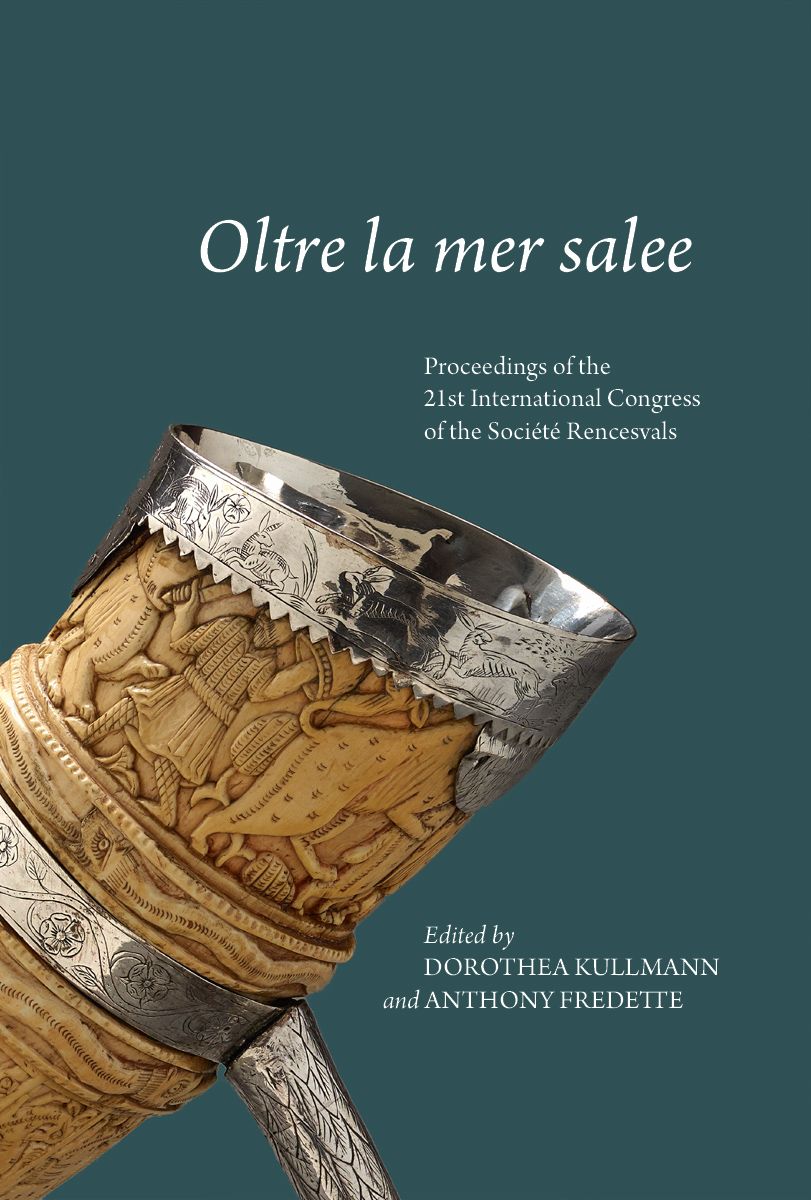
Oltre la mer salee
Proceedings of the 21st International Congress of the Société Rencesvals pour l’étude des épopées romanes, Toronto, 13–17 August 2018
Edited by Dorothea Kullmann & Anthony Fredette
Oltre la mer salee collects revised versions of twenty-eight papers in English, French, Italian, and Spanish originally presented during the 21st International Congress of the Société Rencesvals pour l’étude des épopées romanes. It includes studies by an international group of specialists in medieval vernacular epic, divided among four major themes: family relations, manuscripts, French epic in England, and travel and exchanges. Their work covers a variety of Old French and Old Occitan epics, as well as adaptations and related texts in Italian, Castilian, Brasilian Portuguese, English, and Greek. It also includes reflections on the interactions between Romance epic, the Latin language, and even the fine arts. This volume convincingly demonstrates one of the key elements of the enduring appeal of medieval Romance epic: its astonishingly international quality, both in the Middle Ages and today.
Dorothea Kullmann taught at Göttingen, Heidelberg, and Avignon before becoming an Associate Professor in French and Medieval Studies at the University of Toronto in 2005. She is the author of Verwandtschaft in epischer Dichtung (1992), and Description. Theorie und Praxis der Beschreibung im französischen Roman von Chateaubriand bis Zola (2004), and has published numerous articles – and edited several volumes – on medieval and modern Romance literatures. A specialist of Old French and Old Occitan epic, she is also interested in vernacular religious literature, in the classical tradition, and in the interaction between languages in the Middle Ages, as well as in diachronic linguistics and historical narratology. She currently leads the SSHRC project “Livres d’heures: textes et langue”.
Anthony Fredette recently completed a doctorate at the University of Toronto’s Centre for Medieval Studies. His thesis, under the direction of Dorothea Kullmann, studies the ways in which medieval authors writing in French, Occitan, and Latin made use of Statius’ Thebaid, often through the intermediary of Latin commentary. The various versions of the Old French Roman de Thèbes are a special focus of this study. He is currently teaching Latin while involved in ongoing projects editing medieval commentaries on classical authors.
_________________________________________
Table of contents:
Acknowledgements
Abbreviations
Introduction
Part I: Family Structures, Filiation, and Bastardy
Muriel Ott, Structures familiales, filiation, bâtardise
Bernard Ribémont, Père, mère, mari, épouse et enfants: fonctions narratives de la famille nucléaire dans la chanson de geste
Philippe Haugeard, Ordre lignager et parenté dans Raoul de Cambrai et Garin le Loherenc
Susana G. Artal Maillie, Trois mariages pour Béatrice: encore sur la section Bernier de Raoul de Cambrai
Anne Berthelot, Les généalogies magiques dans les chansons de geste de seconde génération: le cas d’Auberon et celui de Maugis d’Aigremont
Léo-Paul Blaise, Translatio imperii et enjeux généalogiques: la parenté au secours d’une définition du Cycle de Dagobert
Victoria Turner, Saracen Mothers: Sexual Sin and Mixed-Race Relations in Le Bâtard de Bouillon
Part II: Travels and Exchanges
Simone Pinet, Uno por otro: economía de la sustitución en los Siete Infantes de Salas
Leslie Zarker Morgan, Charlemagne et sa famille italienne: Andrea da Barberino et l’acculturation des Carolingiens
Adélaïde Lambert, Multilinguisme et transferts culturels dans les versions d’oc et d’oïl de Fierabras (XIIe–XVIe siècles)
Beate Langenbruch, Charlemagne, le Brésilien: la figure de l’empereur construite par le cordel
Part III: The ‘chanson de geste’ between France and England
Françoise Le Saux, Charlemagne and England: A Reevaluation of the Early Material
Marianne Ailes, Le roi sacré ou la désacralisation du roi dans la chanson de geste en Angleterre?,
Alain Corbellari, Le Voyage de Charlemagne et la versification anglo-normande
Carol Sweetenham, “In Frenssche bookys this rym is wrought”: Looking for the First Crusade in Anglo-Norman and English Narrative Poetry
Part IV: Manuscripts
Gabriele Giannini, Chicago, Montréal, Bruxelles, Damas, etc.: vieux fragments, vieilles questions reformulées
Margherita Lecco, Testo e immagine nei manoscritti del Cycle de la Croisade: la Naissance le Chevalier au Cygne nel MS Paris, BnF, fr. 12558
Emmanuelle Poulain-Gautret, Florence de Rome entre la France et l’Angleterre: le manuscrit M de la chanson
Catherine Emerson, Dreaming of Lotharingia: David Aubert’s Charlemagne and the Creation of a Burgundian State
Part V: Varia
Andrea Ghidoni, Il “pregiudizio testocentrico” nello studio dell’iconografia delle chansons de geste: l’errata interpretazione di un capitello della chiesa aragonese di San Gil de Luna
Peter Chekin, Geste Francor, gent paienor: vestiges d’une latinité orale dans la Chanson de Roland
Edward A. Heinemann, Qui tua Salatré? Étude de syntaxe épique
Giovanni Palumbo et Paolo Rinoldi, Deux auteurs pour la Chanson d’Aspremont?
Dorothea Kullmann, Marjolaine Raguin et Brittany Yuen, La formule dans l’épopée occitane: réflexions autour de la constitution d’une nouvelle base de données
Stephen P. McCormick, Huon d’Auvergne Digital Archive: un rapport d’étape sur l’encodage de texte et les méthodes de numérisation d’images
Dimitri Pétalas, Du nouveau sur le duel entre père et fils et le domptage de la reine amazone
Alicja Bańczyk, Les limites du pouvoir seigneurial dans Renaut de Montauban
Valérie Guyen-Croquez, La vérité en question dans une chanson de geste tardive: complots, dissimulation et mensonges dans les Croniques et Conquestes de Charlemaine de David Aubert
Contributors